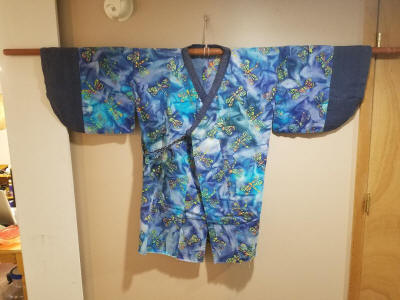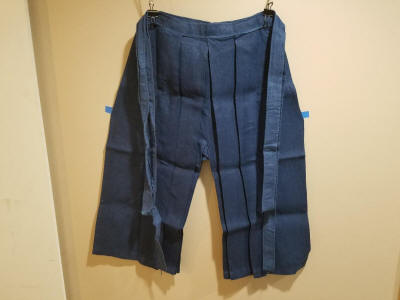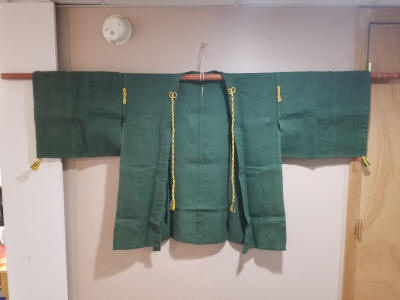


Garb Service
Home Kumihimo Ties Roku Tonbo Yoroi
This service is
to provide both a sewing service for those customers who need Japanese Garb sewn
for them and have the fabric, and for those customers who would like to purchase
Japanese Garb items, to wear at events. Below can be found a breakdown of the
services and the Items available for purchase.
The items for purchase will be sewn upon ordering and will be
custom tailored to fit the customer. I will not be stocking any S,
M, L items. For those customers who already have fabric to be
sewn, the fabric can be shipped to me at your expense. Return
shipping will also be at your expense.
For those customers who wish to purchase items from the list below,
all fabrics will be purchased from JoAnn Fabrics or any number of online
fabric stores. I will ask that any patterned fabrics be found by
the customer, first and I will need to know the website or store the
fabric was found prior to taking any order, as I will not be doing any
searches for you.
All outer layer items will arrive starched, unless otherwise
requested not to.
All kumihimo ties will be an extra charge and prices will be
listed. Please understand that any ties that are made will
significantly increase the time it takes to finish the item, as I make
all the kumihimo ties on the various kumihimo looms and not a machine.
The majority of the ties will be made from DMC Floss. Ties can be
made from silk floss and pricing will be listed below.
Sewing Service
The sewing service I am
providing is for, both, sewing garb where the fabric has already been purchased
by the customer, and sewing the garb items listed below where the fabric has not
been purchased by the customer.
I am charging a flat rate per garment and in lots of three garments.
All garb will be sewn with flat-felled seams, where it can be done, to
reduce the amount of frawing over the life of the garb item.
I will provide approximate pricing for the different fabrics that could be
used, listed as Cottonr, Linen, and Silk. Fabric Prices change
all the time, so please ask when ordering if prices have gone up.
The garb items listed below will contain a picture approximating what
the item will look like, as well as a basic description of the item.
Sewing Service Pricing (labor cost)
$10/hr
*All shipping costs are the responsibility of the customer*
Fabric Pricing
All fabric pricing is based on current prices from Joann Fabrics, Fabrics-Store.com, and various online fabric stores which sell silk. Fabric prices can change at any time.
For most of the garb items listed, it will take between 4-5 yards of fabric to make them. The prices listed are for 1 yard of fabric. Price ranges listed are the minimum and maximum for the fabrics listed, which can be found online.
Cotton can be used for the beginner, but also those that cannot afford Linen just yet.
Linen can be used for those that are not quite a beginner anymore and would like their garb to be more period.
Silk can be used for those that really want to bling out their garb.
| Cotton Pricing depends on the type of cotton fabric being used. $3.89 -- $9.99/yd |
Linen Pricing depends on the weight of the linen fabric being used. $10.85 -- $11.48/yd |
Silk $ |
Japanese Garb Items
Kosode
The kosode is
the basic piece of garb that is worn during the SCA time period. It is also
the first layer, can also be many layers, that is worn against the skin, on top
of the underware. The kosode is named for its small sleeves, but also for the
small opening at the wrists. The kosode offered will have slightly bigger
sleeves, dropwise, than the period counterpart, as I feel it looks better
scalewise. I will also be making them knee length, unless otherwise requested,
as ankle length kosode make it look like you would have a load in your hakama
when wearing hakama.
Kosode should be made from Cotton or
Linen, since it is a layer that will be against the skin. I've added Silk
to the pricing (above), if there will be multiple layers of kosode and silk is desired
for those layers.
The kosode sleeves can be made into tsubo, or narrow, sleeves so they will fit inside kote/fighting gear.
The kosode shown below: The white kosode is a medium weight white linen. The blue dragonfly kosode is a medium weight cotton with medium weight linen used on the sleeve ends and collar. The black kosode is a lightweight linen.
Kosode Pricing (fabric costs for one kosode).
Each kosode uses 4 yards of fabric.
| Cotton $15.56 -- $39.96 |
Linen $43.40 -- $45.92 |
Silk $ |



Hakama
Hakama are the pants that the Japanese wore in period. The hakama offered will be 4 panel per leg hakama as I feel they are more luxurious looking than 2 or 3 panel per leg hakama. If the intent is to wear them for fighting, I can include ties at the ends of the legs, so the hakama legs can be tied up around the knees so they bellow out above the knee. Kyahan ar listed below, at a separate charge, if the hakama are going to be tied up.
The hakama shown below: The blue hakama is a heavy weight linen.
Hakama Pricing (fabric pricing for one hakama)
Each hakama uses 4 yards of fabric.
| Cotton $15.56 -- $39.96 |
Linen $43.40 -- $45.92 |
Silk $ |

Kyahan
Kyahan are lower leg wraps which are worn when the hakama are tied up around the knees.
Hitatare
The hitatare is an outer layer top that was typically worn by the Buke, but in later periods was also worn by the general population. It is basically an open vest with sleeves. Ties, for across the chest and the sleeves can be purchased separately and are listed below.
The hitatare shown below: The blue hitatare is a heavy weight linen (and goes with the blue hakama above). The green hitatare is a medium weight linen, and has closure ties, sleeve ties, and "love" knots (custom braided by me on a marudai).
Hitatare Pricing (fabric pricing for one hitatare)
Each hitatare uses 4 yards of fabric.
| Cotton $15.56 -- $39.96 |
Linen $43.40 -- $45.92 |
Silk $ |


Suikan
The suikan is an outer layer top that was worn by court personel when hunting and is worn over at least one kosode layer. It has narrow body panels and huge open sleeves which are just barely attached to the body panel. Ties for the neck and sleeves can be purchased separately and are listed below.
The suikan shown below: The blue and yellow suikan is a medium weight linen and yellow linen for the sleeve ends and collar, and has neck a closure tie (custom made by me using a marudai).
Suikan Pricing (fabric pricing for one suikan)
Each suikan uses 4 yards of fabric
| Cotton $15.56 -- $39.96 |
Linen $43.40 -- $45.92 |
Silk $ |

Dobuku
The dobuku is an outer layer top akin to a jacket and is worn over at least one kosode layer. It is typically lined, but I can make them unlined for use in the summer, such as at pennsic at night. Ties for across the chest can be purcased separately and are listed below.
The dobuku shown below: The green dobuku is a medium weight linen and is unlined.
Dobuku Pricing (fabric pricing for one dobuku)
Each dobuku uses 4 yards of fabric. If a lining is requested, I can use quilted material (uses 4 yards at $14.99/yd) or batting (mid of light weight poly batting and uses 4 yards at $6.99/yd) and pricing for each is listed below.
| Cotton $15.56 -- $39.96 |
Linen $43.40 -- $45.92 |
Silk $ |
|
| Cotton Quilted Material $59.96 |
Batting $27.96 |
||

Eboshi
The eboshi is the floppy cloth hat that the majority of samurai wore in period and no self respecting samurai would leave their house without wearing one.
The eboshi shown below: The eboshi is a heavy weight linen with a medium weight linen band/tie.
Eboshi Pricing (fabric pricing for one eboshi)
Each eboshi uses 1/2 yard of fabric
| Cotton $1.95 -- $4.99 |
Linen $5.43 -- $5.74 |
Silk $ |

Kumihimo Ties
Pictures and pricing comming soon.
The kumihimo ties that I am offering are for all the garb pieces listed about that require them.
The ties will be listed for the garb piece they are attached to.
I just ask that if any of the ties are purchased, please allow me the time to make them, as I will be braiding them on one of the 4 Japanese kumihimo looms, marudai, kakudai, ayatakadai, or takadai, by hand. It can take quite some time, think hours to multiple weeks, to produce some of the braids.